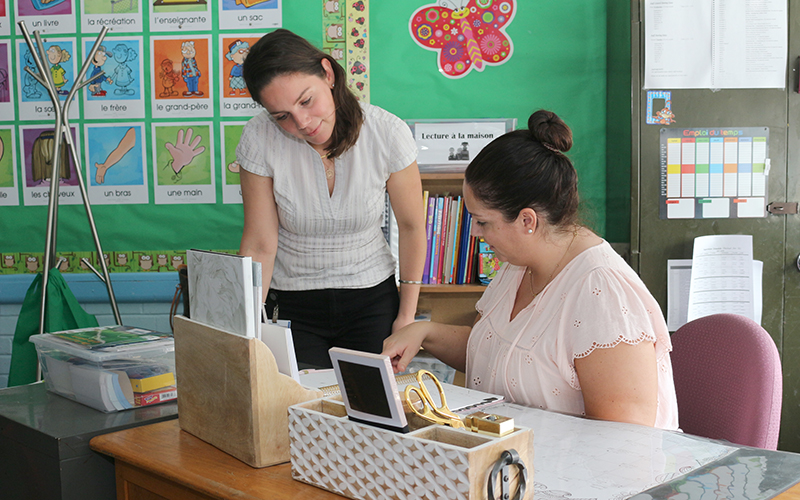Social workers in elementary schools foster students’ social and emotional development
Children across CIUSSS West-Central Montreal’s territory benefit not only from dedicated teachers to help them learn, but also the support of health professionals such as social workers. Social workers ensure that the social and emotional development of students follows along with their academic learning, helping them grow in a safe and caring environment. Julia Karpinski (shown standing), a social worker with the Healthy Schools team in the Frontline Services Directorate, describes her work with students, families and professional staff at the English Montreal School Board’s Sinclair Laird School in the Parc-Extension neighborhood.
What is your main role as a social worker in an elementary school?
The role of the social worker is to support and accompany the parents and to facilitate their access to resources. It can be resources in the school, or services and programs available at the CLSC. I start with receiving the referrals and requests, and evaluating the psychosocial situation of the family and the child. I assess the child’s needs and what the family wants. To get a complete picture of the situation, I interview and meet with the child and parents, with the teachers, as well as with the principal and any other professionals that are involved with the student. I can then assess what the child needs, and from there refer them to the appropriate services.
What are some situations that may require a referral to a social worker?
It could be a simple referral where the parent has difficulty with routine and discipline in the home, and the teacher notes that it is affecting the child’s adaptation in the classroom. The teacher will first meet with the parents, and then propose that they meet with me. If the parent accepts, then a referral form is completed and given to me. I will contact the family and meet with them.
The most common referrals I receive are for issues with behaviour, self-esteem, parents who are divorcing or separating, a death in the family, and finances.
Do you collaborate with teachers and other staff members of the school?
Absolutely! Collaboration is essential to my work. I collaborate with the other professionals in the school, such as the psychologist, speech language pathologist, resource teacher, occupational therapist and specialized educator, as well as my team members from the Healthy Schools team in the CLSC.
What are some of the resources to which you might refer a student?
Most elementary schools have health professionals that work in the school, such as psychologists, speech language pathologists, resource teachers and occupational therapists.
In the CLSCs, I may refer students to the Youth in Difficulty program or to the Youth Mental Health team. Sometimes parents will contact me directly for their own individual support. I can refer parents to general adult services at the CLSC.
Before a referral is made, the teacher, principal and I can meet with the parents to introduce myself to the family, rather than contact the parents over the phone. This creates a less threatening environment.
What value does a social worker bring to the school environment?
The fact that there is a social worker in the school who is associated with the CLSC, and knows not only about the CLSC resources but as well as those in the community, helps a great deal with my consultations.
If a teacher approaches me to offer a workshop on a certain subject, I can do that. I present workshops in the classroom, for instance on the subject of puberty for grade six students, or groups on self-esteem. It is always in response to the needs of the particular school.
Do parents fully understand your role within the school and what you can provide to them?
Often when the words ‘social worker’ are mentioned, families are resistant. I am there to support and accompany parents in the steps they need to take and to get them involved in the decision making. Seeing a social worker is a voluntary service, and it comes down to what the family wants and needs. I am not here to judge, I am here to assess what is going on and to find the right services or help for them. There is no one-size-fits-all approach. It’s very important because every family has a different way of seeing things.
Parents are allowed to call me directly as I work for the CLSC and not the school board. Even if it just to consult, I am there to answer any questions they may have. It is usually in relation to what is going on with their child in school, but it does happen that parents have asked me for resources for themselves. Resources that help the parents help the child! If they are doing well, their child will continue to do well too. If the parent is aware of what resources are available for themselves, it makes them feel more empowered and reflects on their parenting skills.
What do you find most rewarding about working in schools?
I love being a social worker! I really enjoy the school setting. Students need to be happy in the school and in their home. It’s very rewarding to see a child succeed following changes that were made either at school or at home that I helped to facilitate.

